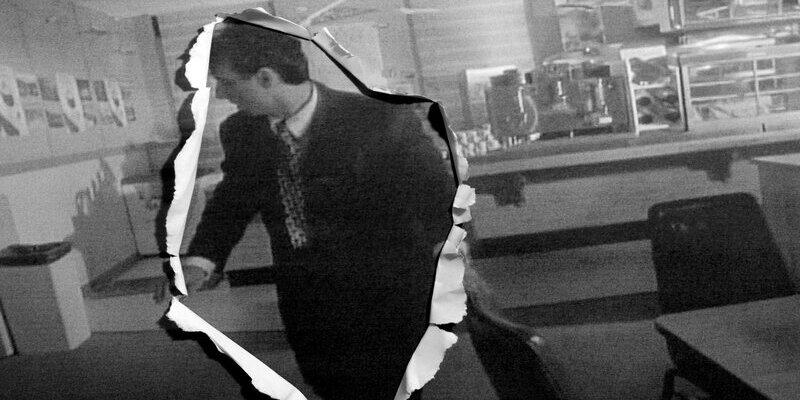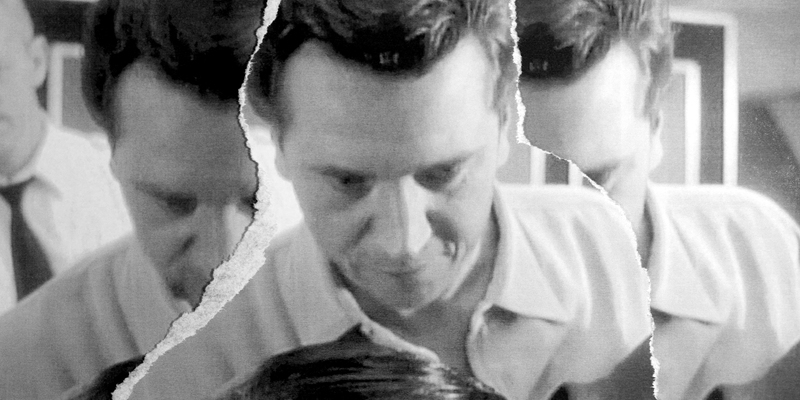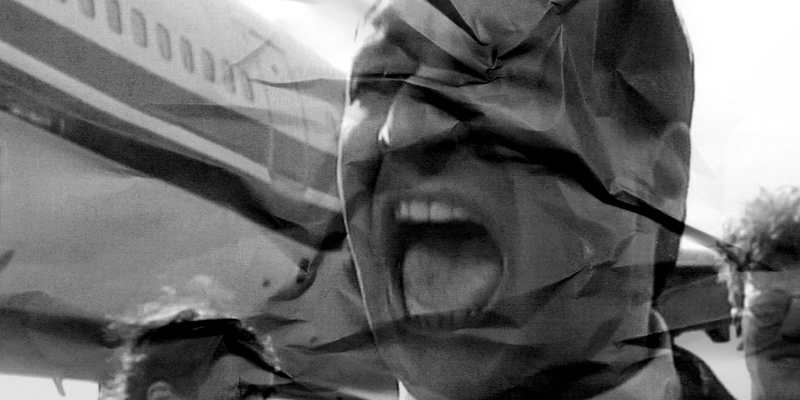
Review by
Benjamin Poole
Directed by: Aristotelis Maragkos

Aristotelis Maragkos’ experimental film,
The Timekeepers of Eternity, is a partly animated re-edit of the old television mini-series
The Langoliers, which is based on the extended short story by Stephen King.
Although it is quite possible to understand and enjoy Maragko’s film
without watching its predecessor, as part of a professional obligation
to provide a full critical analysis of the remix I also took the three
whole hours of the initial TV movie on the chin. Here are my notes:
Directed and written by Tom Holland, 1995’s
The Langoliers is an awful film. Starring jobbing actors
who will be familiar to connoisseurs of this sort of fare (Dean Stockwell, Bronson Pinchot), the plot involves a small group of passengers who awake on an
overnight flight to discover that every other commuter has disappeared.
It turns out that by passing through an unseasonable aurora borealis our
passengers have been shifted slightly backwards out of time. The ragbag
of archetypes - sweet little girl, square jawed hero, obnoxious yuppie
etc - are then made privy to the dark secrets of temporality when it
transpires that the past and all it consists of is eventually ‘eaten’ by
flying alien spheres resembling outsize nu-metal Pac-Men - yikes, etc.

Apart from Pinchot’s extra-value for money performance (‘Captain my
butt’- hahaha), what I liked about The Langoliers was its
central metaphor of air travel, and how Holland (after King) links it to
the subject of time. An airport is by definition a liminal area,
somewhere in between your destination and the place you are leaving.
They are exciting spaces, but uniquely terrifying if you are stranded in
one with the means of departure out of your control. This goes double
for flight, which has immense potential for nightmare scenarios.
The Langoliers does touch upon these features, however the
main aspects of air travel that it replicates is the tedium of it all;
the hanging about, the prolonged waiting for something to happen. At the
mid-point of the film, someone screams ‘Make it STOP!’, but I was hoping
that someone or something would make it ‘START!’; upping the pace of
this TV paced longueur, and making the most of its chewy, fun sci-fi
concept (I’ve just realised: ‘Langolier’ is a play on longueur, isn’t
it?).
It is said that when Michelangelo made La Pietà, the sculptor approached
the anonymous block of Carrara marble, and he could ‘see’ the image of
bereaved mother and Son inside the stone. It was just then a matter of
chipping away the excess marble to ‘free’ the sculpture within. With
The Timekeepers of Eternity at a lean 70 mins, perhaps
this is how Aristotelis Maragkos handled the VHS busting three hours
runtime of The Langoliers. At its most simple, The Timekeepers of Eternity is
similar to what a DJ would call an edit of an existing track, or,
perhaps more accurately, it’s a ‘recontextualization’ (like that Girl
Talk stuff or, my fave, Messypanda): the essentials are intact, but
rejigged, with external elements added which allow us to re-experience
the original text in novel ways (so, for example, a favourite childhood
rap is refreshed when placed over, say, the break beat from a Kate Bush
song: here a mediocre TV film is refreshed by technological filters and
re-edits).

Duly, Maragkos strips the story back to foreground Pinchot’s unhinged
yuppie. Mr. Toomey is plagued by nightmares of his overbearing father
and is an unlikely Cassandra figure who alone understands the impending
threat of the Langoliers (or, as Maragkos prefers, the Timekeepers of
Eternity). BP was the only watchable feature of the OG, and by
streamlining his story, The Timekeepers of Eternity now
has an intriguing, psychological narrative. It helps that here (as in
the 1995 version) Pinchot is as wonderful as he ever was; intense,
funny, creepy - with the black and white giving him the menacing look
and demeanour of a ‘30s Universal horror villain. In Maragkos’
re-imagining, the actor’s inherent desperate sense of his own absurdity
is congruous with the film’s themes of negligible realities, too. When
readdressing the dull televisual saturation of
The Langoliers, Maragkos not only filters the film to an elegant, silver
monochrome but further manipulates the frame by drawing lines and
‘scrumples’ and tears across the screen, as if we are watching a moving
image on stationary: material which is being ripped, layered, scribbled
upon by hands beyond the immediate context. Enhancing the melodramatic
emotes of the TV cast, the screen folds, scrunches and even splits apart
in a plane of existence which is as thin as paper itself. The effect is
pleasingly psychedelic.
The imaginative implications of the mise-en-scene are worn lightly,
however, and serve as a mind-bending background to
Timekeepers of Eternity’s focalised plot, which is tightly retrained from the ponderous flab
of the '90s film into a lean, exciting sci-fi thriller. With a terrible
chronometric fate drawing in on the characters, the mode of the film is
vividly expressive of its story and ideas; as the plot builds to a scary
and stunning cumulation of everything that has come before (no Pac-Men
this time) at one charming point a Švankmajer-esque pair of hands even
edge in from off frame to manipulate the visual set (the heightened
cinema also manages to make sense of the absurd over-delivery of
The Langoliers’ performances, too). And, yes, the meta relevance of the film
(artefacts from the past being omnisciently cannibalised for purposes
beyond both the understanding and the period of the initial situation)
is bit on the nose, but even this feature of
The Timekeepers of Eternity is given weird credence by odd
and delightful moments of synchronicity: a character bemoans that
tasting food in limbo ‘is like chewing paper’, another says that this
sort of time travel doesn’t allow one to nip back and prevent the
assassination of JFK (a concept explicitly explored in the King novel
11/22/63 which came two decades after the publication of The
Langoliers), and, of course, Dean Stockwell was in
Quantum Leap!

Speaking of King, there is a decent essay to be written about the
symbiosis of the author and moving image. From inspiration to the most
celebrated auteurs to the epitome of DTV dreck, King’s stories have
provided IP across the whole cinematic gamut. His iconic status
transcends even the screen - people know ‘redruM’ without having seen
The Shining, my 7 year old nephew obsesses over ‘the it’ and its scary clown
character which comes from a movie he has never seen (I think he’s read
the book, though). Like Dickens - with whom he shares thematic concerns
of class, along with a penchant for memorably crafted character names -
King’s characters and stories have become part of our cultural lexicon
in a way that is exceptional (what’s more, the films which SK was most
closely involved with, the cartoony Maximum Overdrive and
Creepshow, perhaps gives his literary audiences an intuition as to how absurdly
King views his own work...). The symbiosis is reinforced by the great
man’s cameos in adaptations, and he turns up here, too, as a phantom
board-member haunting Mr. Toomey.
The Timekeepers of Eternity is a fascinating addition to
this corpus, as, like the best King, it takes the subject of stories and
storytelling, and explores its motif in a way that is both exhilarating
and entertaining. Constant reader, spend some time here.

The Timekeepers of Eternity is
free to view on Vimeo throughout Otcober. You can watch it below or at
vimeo.com/866783910.
